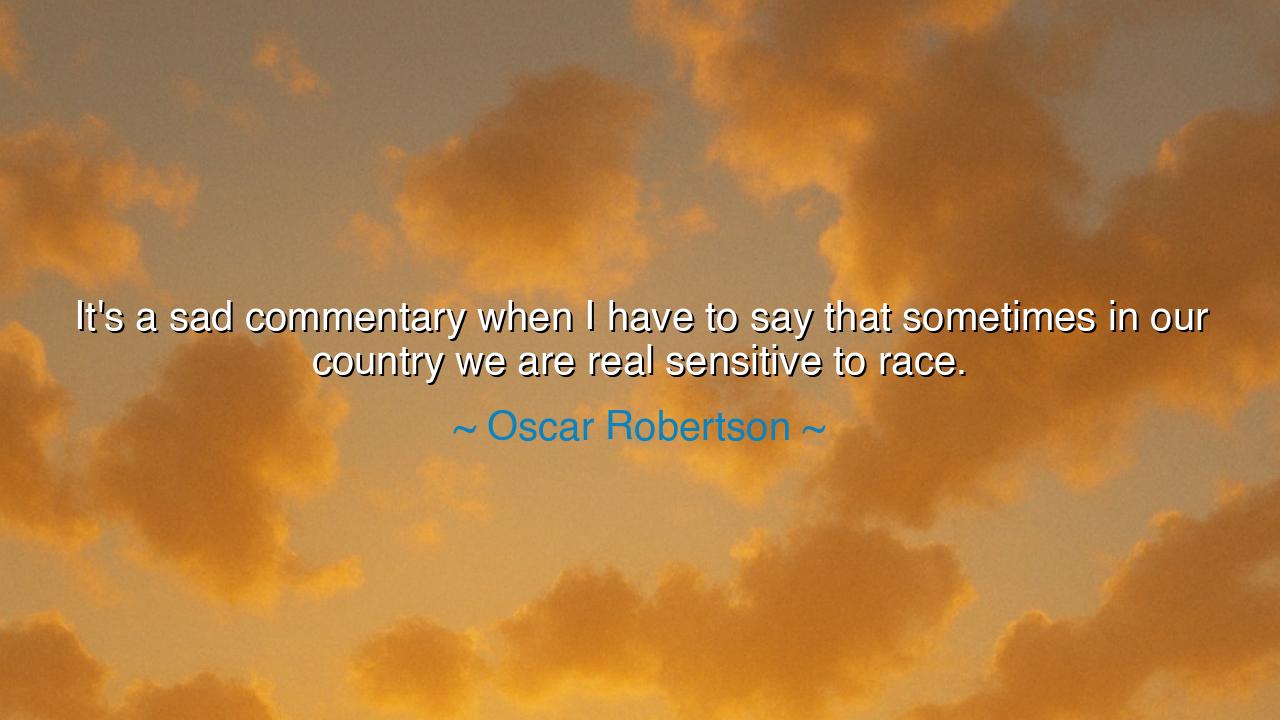
It's a sad commentary when I have to say that sometimes in our
It's a sad commentary when I have to say that sometimes in our country we are real sensitive to race.






Hear the sober words of Oscar Robertson, a legend of the court who carried not only the ball but the burden of history: “It’s a sad commentary when I have to say that sometimes in our country we are real sensitive to race.” This statement does not rise from the joy of victory, but from the sorrow of truth. For he speaks of a wound that has lingered across generations—a wound not of the body, but of the spirit of a nation divided by the color of skin.
The heart of this saying rests in the dual meaning of sensitivity. On one hand, sensitivity can mean awareness, the capacity to feel, to perceive injustice. On the other, it can mean fragility, the inability to bear discussion without anger or division. Robertson laments that in his country, conversations about race too often ignite defensiveness instead of healing. The commentary is “sad” because it shows that centuries after chains were broken, the shadow of prejudice still clings tightly, and truth still cuts too sharply for many to bear.
The ancients knew this struggle of division well. In Rome, free citizens and slaves lived side by side, yet an invisible line always separated them. Though laws shifted and empires changed, the pride of status and the scorn for the “other” endured. Likewise, in ancient Greece, those outside the city-state, the “barbarians,” were seen as less civilized, less worthy, regardless of their own humanity. Across history, the same sickness returns: men create hierarchies of worth, and sensitivity to difference becomes a wall rather than a bridge.
Consider the life of Jackie Robinson, who before Robertson broke the barrier of baseball. His presence was not only athletic but prophetic: every hit, every stolen base, every moment on the diamond was weighed not just as sport, but as a trial of dignity. Robinson endured jeers, death threats, and scorn, yet he persevered. His story mirrors Robertson’s words: the fact that courage must still battle prejudice is itself a sad commentary on the persistence of injustice.
Yet, there is a deeper wisdom here. To be “real sensitive to race” is not only the fault of the oppressor but also the scar carried by the oppressed. A wound touched too many times remains raw, and even the gentlest brush reignites the pain. Robertson’s lament teaches us that the conversation about race is difficult because it is layered with history, memory, and emotion. The sensitivity is not baseless—it is the echo of generations who suffered, and the frustration of progress that has too often been delayed.
The lesson for us, children of tomorrow, is this: do not turn away from the sad commentary, but confront it. For only in facing it openly, without fear or fragility, can healing begin. To deny the sensitivity is to deny the wound; to acknowledge it is the first step toward strength. Courage is not found in silence, but in conversation—sometimes painful, sometimes heated, but always necessary.
Practical wisdom calls to us: listen when others speak of injustice, even if the words sting. Do not dismiss, but reflect. Seek to understand, not to defend. In your own life, refuse to measure worth by outward appearance, but by the integrity of the soul. And in the spaces you inhabit—home, workplace, community—be a bridge where walls once stood. For in every act of justice and compassion, the commentary of sadness can be transformed into a song of hope.
Thus, the words of Oscar Robertson remain not only as lament but as warning: “It’s a sad commentary when we are real sensitive to race.” Let us strive so that future generations will not inherit the same wounds. Let the commentary of tomorrow be one not of sadness, but of triumph—that the chains of division were broken, that the walls of prejudice were torn down, and that humanity at last learned to see itself as one.






AAdministratorAdministrator
Welcome, honored guests. Please leave a comment, we will respond soon